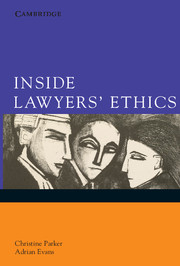Book contents
- Frontmatter
- Contents
- Preface
- Acknowledgments
- List of tables
- List of figures
- List of illustrations
- List of case studies
- Table of statutes
- Table of cases
- 1 Introduction: Values in Practice
- 2 Alternatives to Adversarial Advocacy
- 3 The Responsibility Climate: Regulation of Lawyers' Ethics
- 4 Civil Litigation and Excessive Adversarialism
- 5 Ethics in Criminal Justice: Proof and Truth
- 6 Ethics in Negotiation and Alternative Dispute Resolution
- 7 Conflicting Loyalties
- 8 Lawyers' Fees and Costs: Billing and Over-Charging
- 9 Corporate Lawyers and Corporate Misconduct
- 10 Conclusion – Personal Professionalism: Personal Values and Legal Professionalism
- Index
- References
1 - Introduction: Values in Practice
- Frontmatter
- Contents
- Preface
- Acknowledgments
- List of tables
- List of figures
- List of illustrations
- List of case studies
- Table of statutes
- Table of cases
- 1 Introduction: Values in Practice
- 2 Alternatives to Adversarial Advocacy
- 3 The Responsibility Climate: Regulation of Lawyers' Ethics
- 4 Civil Litigation and Excessive Adversarialism
- 5 Ethics in Criminal Justice: Proof and Truth
- 6 Ethics in Negotiation and Alternative Dispute Resolution
- 7 Conflicting Loyalties
- 8 Lawyers' Fees and Costs: Billing and Over-Charging
- 9 Corporate Lawyers and Corporate Misconduct
- 10 Conclusion – Personal Professionalism: Personal Values and Legal Professionalism
- Index
- References
Summary
Introduction: Ethics and Lawyering
CASE STUDY 1.1 The Jewish QC and the Alleged Nazi War Criminal
In early 2001, newspapers reported that a leading Melbourne criminal barrister and civil rights advocate had been asked to represent suspected war criminal Konrad Kalejs in a hearing to determine whether Kalejs should be extradited to Latvia to face charges over the deaths of tens of thousands of Jews and others during World War II. The relevant barrister was a Queens Counsel and was also prominent in the Jewish community, a former president of Liberty Victoria (a civil rights organisation) and well known for representing a variety of high-profile criminal accused including Julian Knight (in his trial for the Hoddle Street massacre), John Elliott (who was cleared of corporate fraud), and members of Hells Angels. The barrister was, reportedly, born in 1946 in Russia. His parents fled to Germany when he was six weeks old and later settled in Israel. They migrated from there to Australia in 1959. In 1997 he ‘was quoted as telling The Herald Sun that elderly Jews living in Melbourne would be having sleepless nights knowing Mr Kalejs was walking free in Melbourne’. Mr Kalejs was 87 at the time of the extradition proceedings. He denied the allegation that he had served as an officer in a death squad within a Latvian war camp where an estimated 20,000 to 30,000 Jews, Gypsies, Red Army soldiers and others were executed, or died of starvation or torture at the camp.
Information
- Type
- Chapter
- Information
- Inside Lawyers' Ethics , pp. 1 - 20Publisher: Cambridge University PressPrint publication year: 2007
